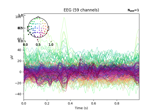mne_realtime.LSLClient#
- class mne_realtime.LSLClient(info=None, host='localhost', port=None, wait_max=10.0, tmin=None, tmax=inf, buffer_size=1000, verbose=None)[source]#
LSL Realtime Client.
Warning
This object is deprecated in favor of
mne_lsl.stream.StreamLSL.- Parameters:
- infoinstance of
mne.Info|None The measurement info read in from a file. If None, it is generated from the LSL stream. This method may result in less info than expected. Also, the channel type of the LSL stream must be one the MNE supported channel types: ‘ecg’, ‘bio’, ‘stim’, ‘eog’, ‘misc’, ‘seeg’, ‘ecog’, ‘mag’, ‘eeg’, ‘ref_meg’, ‘grad’, ‘emg’, ‘hbr’ or ‘hbo’. If the channel type is EEG, the standard_1005 montage is used for electrode location.
- host
str The LSL identifier of the server. This is the source_id designated when the LSL stream was created. Make sure the source_id is unique on the LSL subnet. For more information on LSL, please check the docstrings on StreamInfo and StreamInlet in the pylsl.
- port
int|None Port to use for the connection.
- wait_max
float Maximum time (in seconds) to wait for real-time buffer to start
- tmin
float|None Time instant to start receiving buffers. If None, start from the latest samples available.
- tmax
float Time instant to stop receiving buffers.
- buffer_size
int Size of each buffer in terms of number of samples.
- verbosebool,
str,int, orNone If not None, override default verbose level (see
mne.verbose()for more).
- infoinstance of
- get_data_as_epoch(n_samples=1024, picks=None, timeout=None)[source]#
Return n_samples from LSL in FIFO order.
- Parameters:
- n_samples
int Number of samples to fetch.
- picks
str| array_like |slice|None Channels to include. Slices and lists of integers will be interpreted as channel indices. In lists, channel type strings (e.g.,
['meg', 'eeg']) will pick channels of those types, channel name strings (e.g.,['MEG0111', 'MEG2623']will pick the given channels. Can also be the string values'all'to pick all channels, or'data'to pick data channels. None (default) will pick all channels. Bad channels are included by default. Note that channels ininfo['bads']will be included if their names or indices are explicitly provided.- timeout
float|None Maximum amount of time to wait for data from LSL if None: waits for 5x n_samples / sfreq
- n_samples
- Returns:
- epochinstance of
EpochsArray|None The samples fetched as an Epochs object. None if no data was returned from pylsl.
- epochinstance of
See also
- register_receive_callback(callback)#
Register a raw buffer receive callback.
- Parameters:
- callback
callable() The callback. The raw buffer is passed as the first parameter to callback.
- callback
- start()#
Start the client.
- start_receive_thread(nchan)#
Start the receive thread.
If the measurement has not been started, it will also be started.
- Parameters:
- nchan
int The number of channels in the data.
- nchan
- stop()#
Stop the client.
- stop_receive_thread(stop_measurement=False)#
Stop the receive thread.
- Parameters:
- stop_measurementbool
Also stop the measurement.
- unregister_receive_callback(callback)#
Unregister a raw buffer receive callback.
- Parameters:
- callback
callable() The callback to unregister.
- callback
